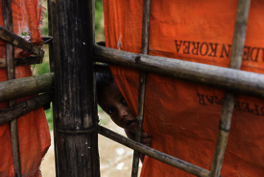By Whitney Simon | Manager, Global Cause Partnerships
Dear Friend,
Over two and half years after the initial influx began, nearly 855,000 Rohingya refugees remain in Cox’s Bazar District of Bangladesh, 54.2 percent of whom are children. Rohingya children continue to suffer from acute malnutrition as well as vaccine-preventable and water-borne diseases. Conditions are not yet in place for the safe, dignified and voluntary return of Rohingya refugees to Myanmar, and no feasible durable solutions have been identified. Consequently, time has begun to wear down families’ existing coping mechanisms, placing children increasingly at risk of early marriage, hazardous labor, trafficking and getting pulled out of school, among other concerns. These negative effects are compounded by COVID-19, which has been confirmed within Cox Bazar.
Rohingya refugees remain fully dependent on humanitarian assistance, with relatively no access to livelihoods or cash assistance. Household vulnerability within the camps is increasing. In 2019, only 54 percent of households met an acceptable level of food consumption, with dietary diversity a key concern, contributing to the continued serious levels of acute malnutrition among children. In 2019, 11 percent of children under five were acutely malnourished.
Within this humanitarian context, women, adolescents and people with disabilities are particularly affected. Women face restrictions on their freedom of movement as well as high levels of violence. Rohingya adolescents, meanwhile, face multi-faceted and interlinked issues, including access to adequate services, quality learning opportunities, sociocultural challenges including exposure to violence, sexual harassment and assault; and adverse social practices such as child marriage and child labor. Children with disabilities in the camps are often isolated, reducing their social network, inclusion and access to services.
Thanks to your support, in 2019, UNICEF and partners reached full coverage of access to water, sanitation and hygiene (WASH) services for Rohingya children and their families within UNICEF-supported camps. Additional key results include:
Throughout 2020, UNICEF will provide girls, women, the elderly and people with disabilities with modified WASH infrastructure to meet their needs. Additionally, UNICEF and education partners will work to identify new and innovative solutions to ensuring that adolescent girls are able to realize their right to education including single-sex class shifts and female volunteers to escort them to and from classes. Inclusive education initiatives will also be scaled up, and all programs will focus on ensuring the integration of children with disabilities. Your continued support is crucial to enhancing UNICEF’s ability to efficiently scale up its response within the Rohingya refugee camps.
Sincerely,
Whitney Simon
Links:
Project reports on GlobalGiving are posted directly to globalgiving.org by Project Leaders as they are completed, generally every 3-4 months. To protect the integrity of these documents, GlobalGiving does not alter them; therefore you may find some language or formatting issues.
If you donate to this project or have donated to this project, you can receive an email when this project posts a report. You can also subscribe for reports without donating.
